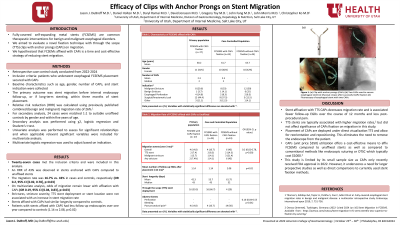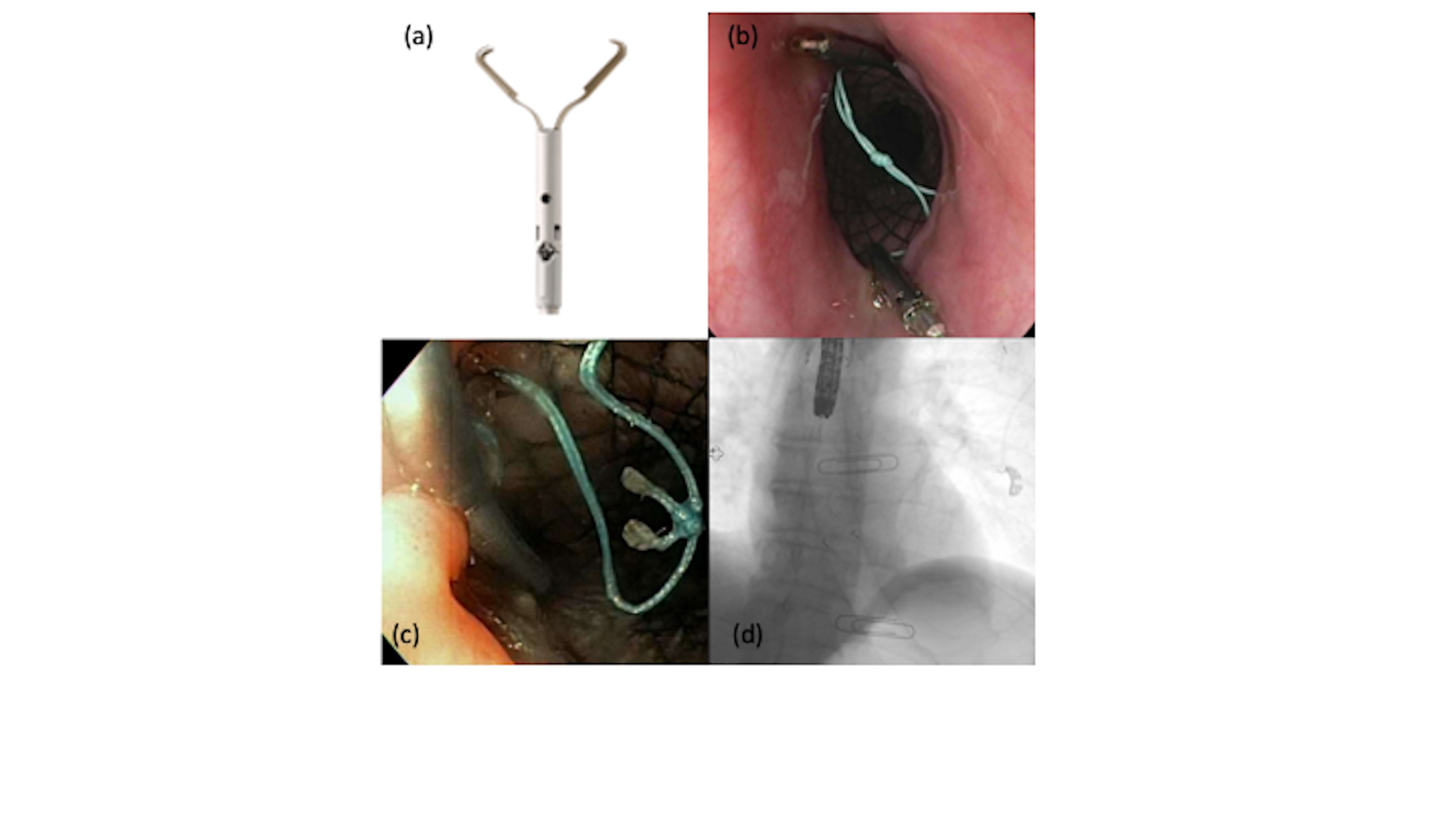Sunday Poster Session
Category: Interventional Endoscopy
P1065 - Reduced Migration of Esophageal Fully Covered Self Expanding Metal Stents Affixed with Clips with Anchor Prongs
Sunday, October 27, 2024
3:30 PM - 7:00 PM ET
Location: Exhibit Hall E

Has Audio

Jason DuBroff, MD, MPH
University of Utah
Salt Lake City, UT
Presenting Author(s)
Jay DuBroff, MD, MPH1, Daniel Holten, MD2, David Jonason, MD1, Gregory Toy, MD1, Daryl Ramai, MD, MPH, Msc2, Christopher Ko, MD, MA1
1University of Utah, Salt Lake City, UT; 2University of Utah Health, Salt Lake City, UT
Introduction: Fully-covered self-expanding metal stents (FCSEMS) are a common treatment for benign and malignant esophageal disorders. Stent migration is a known complication, providing opportunities for novel anti-migratory techniques. We examined the efficacy of clips with anchor prongs (CAPs) for FCSEMS fixation to minimize migration.
Methods: A retrospective chart review was performed for patients who had placement of FCSEMS affixed with CAPs with migration as a primary endpoint. 27 cases were identified from 1/2022 to present. Endoscopic technique of CAPs stent fixation is described in figure 1. Primary outcome of interest was stent migration, additional covariates and descriptive statistics detailed in table 1. Relative risk reduction (RRR) was calculated using previously published data on unaffixed FCSEMS migration. For secondary analysis, 14 cases were matched 1:1 to suitable unaffixed controls by gender and within five years of age to evaluate possible confounding variables. Secondary analysis was performed using χ2, logistic regression and Student’s t test.
Results: Mean age was 60.2 years and included 41% women. Technical success was achieved in 100% of cases. Stent migration was observed in four cases (14.8%) overall. The only reported adverse event was post-procedural pain (n=4). Adler et al. (2019) previously described a migration rate of 26% among unaffixed FCSEMS indicating a RRR of 43% compared to FCSEMS affixed with CAPs. One migration event was due to an unsuccessful 2-hour attempt at feeding tube placement by primary team. Excluding this aberrant case yields a RRR of 57.3%. Secondary analysis showed migration was not significantly associated with strictures either benign or malignant, or through the scope stent deployment and showed decreased odds of migration among CAPs patients (OR 0.13, p=0.03).
Discussion: CAPs are currently used for large defect closure as the design allows for deep and secure approximation of tissue edges, which provides desirable properties for short-term affixation of FCSEMS which may result in fewer migrations without restricting stent removal. Additionally, CAPs (unit price $350) fixation is a cost-effective option given that over-the-scope clips typically cost $1000. CAPs only recently received FDA approval in 2022, which limits available sample size for this study. Larger prospective studies are needed to investigate the efficacy of CAPs fixation in preventing FCSEMS migration.

Note: The table for this abstract can be viewed in the ePoster Gallery section of the ACG 2024 ePoster Site or in The American Journal of Gastroenterology's abstract supplement issue, both of which will be available starting October 27, 2024.
Disclosures:
Jay DuBroff, MD, MPH1, Daniel Holten, MD2, David Jonason, MD1, Gregory Toy, MD1, Daryl Ramai, MD, MPH, Msc2, Christopher Ko, MD, MA1. P1065 - Reduced Migration of Esophageal Fully Covered Self Expanding Metal Stents Affixed with Clips with Anchor Prongs, ACG 2024 Annual Scientific Meeting Abstracts. Philadelphia, PA: American College of Gastroenterology.
1University of Utah, Salt Lake City, UT; 2University of Utah Health, Salt Lake City, UT
Introduction: Fully-covered self-expanding metal stents (FCSEMS) are a common treatment for benign and malignant esophageal disorders. Stent migration is a known complication, providing opportunities for novel anti-migratory techniques. We examined the efficacy of clips with anchor prongs (CAPs) for FCSEMS fixation to minimize migration.
Methods: A retrospective chart review was performed for patients who had placement of FCSEMS affixed with CAPs with migration as a primary endpoint. 27 cases were identified from 1/2022 to present. Endoscopic technique of CAPs stent fixation is described in figure 1. Primary outcome of interest was stent migration, additional covariates and descriptive statistics detailed in table 1. Relative risk reduction (RRR) was calculated using previously published data on unaffixed FCSEMS migration. For secondary analysis, 14 cases were matched 1:1 to suitable unaffixed controls by gender and within five years of age to evaluate possible confounding variables. Secondary analysis was performed using χ2, logistic regression and Student’s t test.
Results: Mean age was 60.2 years and included 41% women. Technical success was achieved in 100% of cases. Stent migration was observed in four cases (14.8%) overall. The only reported adverse event was post-procedural pain (n=4). Adler et al. (2019) previously described a migration rate of 26% among unaffixed FCSEMS indicating a RRR of 43% compared to FCSEMS affixed with CAPs. One migration event was due to an unsuccessful 2-hour attempt at feeding tube placement by primary team. Excluding this aberrant case yields a RRR of 57.3%. Secondary analysis showed migration was not significantly associated with strictures either benign or malignant, or through the scope stent deployment and showed decreased odds of migration among CAPs patients (OR 0.13, p=0.03).
Discussion: CAPs are currently used for large defect closure as the design allows for deep and secure approximation of tissue edges, which provides desirable properties for short-term affixation of FCSEMS which may result in fewer migrations without restricting stent removal. Additionally, CAPs (unit price $350) fixation is a cost-effective option given that over-the-scope clips typically cost $1000. CAPs only recently received FDA approval in 2022, which limits available sample size for this study. Larger prospective studies are needed to investigate the efficacy of CAPs fixation in preventing FCSEMS migration.

Figure: Figure 1. (a) Clip with anchor prongs (CAPs) (b) Two CAPs used to secure esophageal stent (c) Mucosal crease after successful CAPs fixation (d) Fluoroscopy of esophageal stent with two CAPs. CAPs-affixed stents are dislodged with a firm downward tug at distal end of stent and do not require specialized equipment for removal.
Note: The table for this abstract can be viewed in the ePoster Gallery section of the ACG 2024 ePoster Site or in The American Journal of Gastroenterology's abstract supplement issue, both of which will be available starting October 27, 2024.
Disclosures:
Jay DuBroff indicated no relevant financial relationships.
Daniel Holten indicated no relevant financial relationships.
David Jonason indicated no relevant financial relationships.
Gregory Toy indicated no relevant financial relationships.
Daryl Ramai indicated no relevant financial relationships.
Christopher Ko indicated no relevant financial relationships.
Jay DuBroff, MD, MPH1, Daniel Holten, MD2, David Jonason, MD1, Gregory Toy, MD1, Daryl Ramai, MD, MPH, Msc2, Christopher Ko, MD, MA1. P1065 - Reduced Migration of Esophageal Fully Covered Self Expanding Metal Stents Affixed with Clips with Anchor Prongs, ACG 2024 Annual Scientific Meeting Abstracts. Philadelphia, PA: American College of Gastroenterology.
